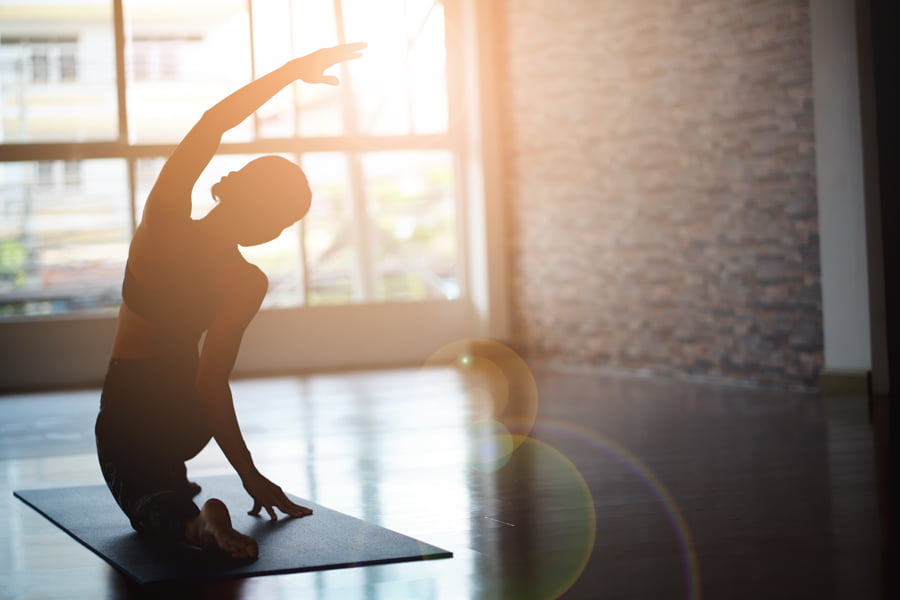There are numerous treatment methods for substance use and addiction. Most rehab centers use traditional methods. However, more are starting to use alternative and holistic therapies to complement those methods. These therapies provide individuals who want to recover with the tools that they need to achieve and maintain recovery. Take a look at what yoga therapy is and how it works as a complement to other addiction therapy programs at Crestview Recovery.
What Is Yoga Therapy?
As an ancient Eastern practice of healing, yoga is a natural type of medicine. Rather than use it as the only form of treatment, however, we combine it with traditional treatment methods. Yoga uses sets of specific physical postures to teach patients how to connect their bodies and minds. The purpose of this practice is to encourage self-awareness to help patients focus on their spirituality.
Yoga therapy is not a 12-step program, but it may be an important part of your addiction treatment. It can help you learn how to control your thoughts and emotions, which is an essential skill for recovery.
One of the main goals of yoga therapy is to increase self-awareness. In order to do this, we use a variety of techniques including breath work, meditation, and mindfulness. Through these practices, you will learn how to be more present in the moment and less focused on your thoughts. This can help you better control your emotions and avoid triggers for your addiction.
In addition to self-awareness, yoga therapy can also help you increase your physical strength and flexibility. This is important for recovery because it can help you cope with stress and avoid potential relapse triggers.
How Yoga Affects the Brain
Alcohol and drugs alter the reward system in the brain. This system controls emotions, decision-making, impulses, and pleasure. The damage that drugs cause in the brain begins to heal and repair during recovery. Rehab centers use yoga to enhance this natural healing process of the body.
Research shows that yoga and Pilates therapy can increase the levels of gamma-aminobutyric acid (GABA) in the brain. This is a natural tranquilizer that the brain produces to manage anxiety and stress. The more GABA that the brain produces, the less anxiety and stress people feel. Along with depression, these are common withdrawal symptoms, and studies show that yoga can lessen their effects.
When individuals are stressed, their blood pressure, body temperature, breathing, and heart rate quicken. According to research, yoga acts on the response system that causes this reaction. It balances and regulates adrenaline and cortisol, which are stress hormones, to reduce the symptoms of stress. Yoga can also enlarge the hippocampus and other regions of the brain that control stress.
Yoga Balances the Body and Mind
Drug abuse and addiction also cause an imbalance between parts of the brain and the body. Yoga can help people in recovery become more in tune with their bodies. This helps them learn how to listen to what their bodies need and to regulate their breathing.
Yoga therapy also teaches those who practice it how to channel their energy inward. Individuals in addiction treatment programs can use this to learn how to own their feelings and control them. As a result, the practice makes them more confident and self-reliant. For example, they may be able to better recognize cravings and manage them so that they don’t fall into relapse.
Furthermore, yoga as an addiction therapy can enhance the spiritual concepts of 12-step programs. This helps individuals in recovery to make a connection through breathing, meditation, and mindfulness. They can use self-reflection to find inner peace and determine what they need to change to make their lives better.
Other Benefits of Yoga for Drug Addiction
Yoga clearly has many physical, psychological, and spiritual benefits for individuals in drug addiction treatment. It improves flexibility and concentration and can make the spine longer and stronger. The practice can also help those in recovery develop patience and calm their minds. Some other benefits include:
- Better sleep
- Emotional healing
- Healthier eating and exercise habits
- Increased energy and stamina
- Pain relief
All of these benefits combine to improve the overall health and wellness of people who are recovering from drug addiction. This is what makes yoga such a great complement to traditional treatment methods.
Take Yoga at Crestview Recovery
 Whether you or a loved one has an addiction to alcohol, illicit drugs, or prescription pain pills, Crestview Recovery can help. With a clinic in Portland, Oregon, we use evidence-based methods to treat all kinds of addictions. Some of the programs that we offer include:
Whether you or a loved one has an addiction to alcohol, illicit drugs, or prescription pain pills, Crestview Recovery can help. With a clinic in Portland, Oregon, we use evidence-based methods to treat all kinds of addictions. Some of the programs that we offer include:
- Outpatient treatment: With this program, you can continue to live at home while attending therapy sessions during the week.
- Intensive outpatient treatment (IOP): If you need more structure than what outpatient care offers, our IOP program requires that you live at home but check into our facility for 9-10 hours each day, four to five days per week.
- Rehab aftercare: Once you’ve completed drug rehab, our aftercare services can help you maintain your sobriety.
End the control that addiction has over your life or the life of someone you love. You can recover from addiction by combining traditional treatments with yoga therapy and other holistic methods. Call Crestview Recovery now at 866.262.0531 to begin the process of recovery.
































